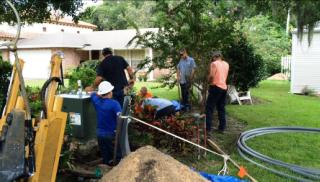|
Article Courtesy of The
Orlando Sentinel By Steven
Lemongello
Published September 9, 2015
Winter Park is spending $3.5 million a year for the next decade to bury its
remaining electrical wires. But the wires on private property are another
matter..
So the city and its electric utility have launched a rare marketing campaign to
entice 5,000 residents to go along with burying the service wires on their
properties.
And if that carrot doesn't work, utility
officials say, they may have to use the stick.
"Service" wires, located on private property, are separate from
the primary and secondary wires being buried underground as part
of the city's decade-long plan. Already, 60 percent of the city
utility's wires are underground.
Usually, so-called undergrounding is a joint effort between a
city that wants to improve the way streets look and electric
companies that will do the work if the city pays for it. So the
extra work of burying service wires can fall through the cracks
and leave solitary poles connected by overhead wires to single
homes. |
|
Winter Park Electric Utility workers doing work on a neighborhood near
Lake Sue, one of the next areas for wires to be undergrounded.
|
But in Winter Park, the city owns the electric utility. It's
spending $3.5 million a year, paid for through capital reserves, to continue the
undergrounding of lines around town — and it's also taking a more active role in
dealing with service wires.
The city is reaching out to customers and even knocking on doors to let them
know about a discount available if they agree to bury their service wires at the
same time as the city is burying the main wires in their neighborhood.
Instead of the usual $3,000 cost of burying service wires, "If we get the
homeowner to agree to underground the service wires, we'll do it for $1,000.
Then we don't have to schedule it separately, and we don't have to put a crew
out separately."
Unfortunately for some customers, it's too late. They've paid the full freight
to have their wires buried because many did not know the discounts existed. Of
those customers who made the transition, only a third took advantage of the
program.
"We're just doing a poor job of marketing," Warren said. "I've had people say,
'Gosh, you should have told me earlier', or 'Gosh, I wish there was a payment
plan.'"
So more mailers will go out in the coming weeks, more cards will be handed out,
more doors will be knocked on.
Full Sail also created a video starring Mayor Steve Leary, walking along one of
the newly pole-free streets and praising the program.
The city is offering upfront payment as well as one- and two-year payment plans,
and also hopes that peer pressure will have an effect on customers from
neighbors who don't want to see one or two stray poles and wires on their
streets.
Duke Energy spokeswoman Suzanne Grant said that such a "proactive" incentive
program is unique.
While Winter Park requires burying service wires for new construction or an
expansion that doubles a property's value, Duke and other private utilities are
required by the state Public Service Commission to build in the "most economic
manner possible" — which results in cheaper overhead wires.
Burying existing overhead wires is usually only done in connection with a
homeowners association or city — as Winter Park is also doing with its recently
annexed, Duke-serviced areas along West Fairbanks Avenue — and usually companies
won't offer such discounts.
But what would happen to those who refuse?
After undergrounding, "from a reliability and aesthetic point of view, we are
less about poles," Warren said. "On Temple Drive, there are quite a few service
poles, but once we [buried] the primary and secondary wires, we quit pruning.
The poles are left back in the trees."
At some point, the city would be using bucket trucks only for maintenance of
service poles — at which point the city would need to assess whether it should
continue to even have them at all.
"You can't keep bucket trucks just because a few customers didn't want to
convert," he said.
Customers with overhead service wires might be required to handle maintenance
themselves by calling electricians, Warren said.
If all else fails, though, there are what he called the "heavy hand" methods.
Among them:
-
Underground by a certain time or the city will do it and
put a lien on the property or place a 48-month assessment on the bill.
-
Bill extra for service calls related to overhead service
wires, or increase the customer service charge.
-
Possibly even discontinue service for overhead service
wires.
Warren said that the city hopes it doesn't get that far and that the incentive
program works they way they plan. Already, he said, about 75 percent of those
informed about the discount have reacted positively.
"We'll start now," Warren said. "And if at the end of the day we have a few
hundred left? Then we'll discuss what our strategy is."
|
